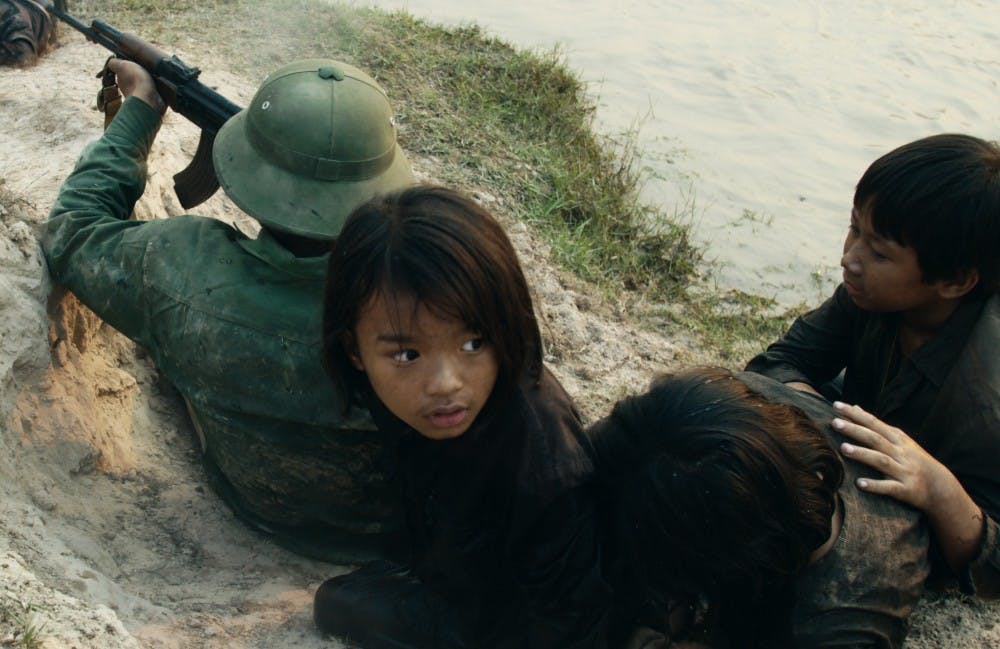Being an international human rights, bestselling author, and Golden Globe Nominee were more than enough to earn Loung Ung a keynote speaking event at Perry World House last Friday. But unlike most of the speakers brought to Penn, she was once a refugee and child soldier. It’s no wonder Penn FilmAid had been arranging to plan an event with her since February.
Before Loung Ung’s keynote lecture on Friday, October 26, the Co–Vice President of Penn Filmaid, Laurel Jaffe (C’20), expressed her excitement about having such an inspirational and unique speaker come to Penn.“It's really been a long process but we are just so excited that Loung Ung has agreed to come share her story and really get in depth with the next generation of screenwriters, of student activists, whatever it may be–she really wants to connect with the students and make them aware of what's going on in the world.”
Penn FilmAid began in the summer of 2017 when a small group of students traveled to Kakuma Refugee Camp and Kalobeyei Refugee Settlement in Kenya to work with local refugees, creating documentaries and Virtual Reality 360 videos to communicate the refugee experiences there. This profound experienced motivated students to continue working with refugee communities and helping them tell their stories.
“I never realized before what an impact film in general could have on a community and on the world...and through this I saw what a tool it could be for empathetic and social change, and it really allowed people to connect, inspire, and relate to one another...When the group came back to Penn in the fall we were like, 'This was such an amazing experience; we don't want it to just end on that program,’” Laurel said of the expedition.
Since then, Penn FilmAid has recruited over 150 members, many of whom gathered with fellow students and community members to hear Loung Ung speak at Perry World House. As the audience took their seats into the visually open, welcoming space, the President of Penn FilmAid, Sonari Chidi (C’20), remarked on the location.
“I think it’s really amazing that we’re in such an apt venue for this event because Perry World House was built to gather the widest cross–section of our community and our society: not just college students or intellectuals but community members of all ages, genders, races, origins, ethnicities...in other words, you’re in the right place and your participation is really welcomed and valued.”
Loung Ung took the stage with the steel of a survivor. Despite English being her fourth language, she spoke with incredible confidence and grace. Ung described her wholesome, picturesque childhood that was eventually stolen from her. She told stories of her three brothers and sisters whom she played and fought with in a country so dear to her heart. “For the first five years of my life, I was able to live it with security, peace and love. I was able to live it in a country, Cambodia, the size of the state of Oklahoma, that was so beautiful and green...I have yet to find that green crayon in a box of 164…”
“My life was charmed. But that charmed life would come to an end on April 17th, 1975. That day, the Khmer soldiers stormed into my city. They came in with their guns and grenades, wearing black shirts and pants, big smiles on their faces.”
Ung related how her life and the lives of many other Cambodians were suddenly pulled out from under them. In only 72 hours, all 2 million residents of the Cambodian capital Phnom Penh were evacuated from the city. They were sent to villages resembling work camps, laboring endlessly for a war they didn’t support, know, or vote for.
“Where would you find sanctuary for your mind, for your body, for your heart, for your spirituality, for your soul, if that had been your country? How would you keep alive?,” Ung asked the crowd.
As Loung Ung continued to share her heartbreaking story of being separated from her family members and indoctrinated by violent strangers while witnessing death, disease, and starvation, a few tears were shed in Perry World House. While many of the people in the room could never have imagined bearing witness to such terrifying events, for a few moments their hearts opened up and they shared the pain of a young girl fighting to survive in a country that had become a prison.
Ung concluded her speech and lightened the mood by sharing the stories of the American families who welcomed her in Vermont and helped her heal so she could become the inspirational activist, author, and screenplay writer she is today. She also compelled the audience to engage in activism themselves.
“In my three decades of writing and activism, I believe this to be true: the two sides of my healing path…[have] been the ability to go inward...to heal the scarred wounds of my childhood. But also the ability to take that experience and go outward...and this for me was done through activism.”
Loung Ung’s documentary, “First They Killed My Father,” is available to stream on Netflix.







